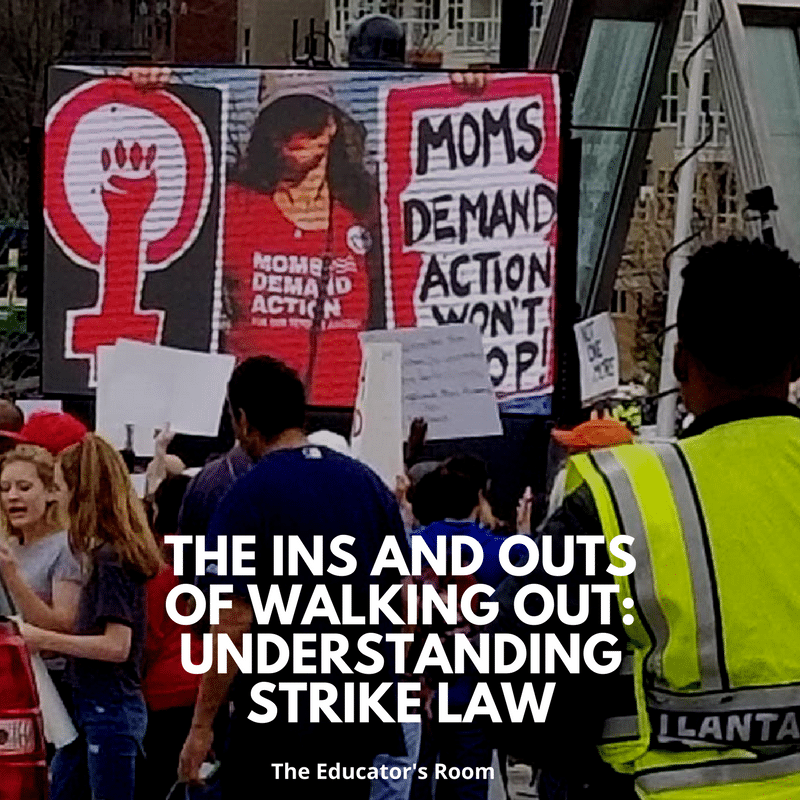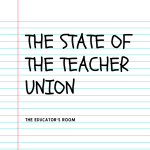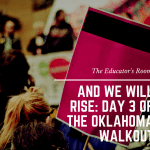Understanding the legality and process of recent teacher strikes is a daunting task. As a part of the public sector, education protocol is governed by statutory and case law. Since primary control of the public education system is relegated to individual states, school law differs from state to state. This includes laws about teacher unions and strikes.
The Wagner Act of 1935 gave union protection to private sector employees. This federal law does not cover public sector employees. As public-sector employees, teachers are subject to state laws related to collective bargaining. They are also protected by the First Amendment, which makes it illegal to ban unions (Dayton, 2012).
Union-related laws are characterized two ways. Currently, 28 states have right to work laws in place. In right to work states, collective bargaining is not allowed. Educators can join professional organizations in these states, but these groups do not have the same bargaining power as traditional unions. In contrast, teachers in states with fair share laws are required to at least partially participate in teacher unions. While these educators are not required to join a union, those who do not are required to pay their fair share of union dues or agency fee. As the NEA website explains, these non-members are required to pay reduced dues since both members and non-members benefit from collective bargaining.
In addition to laws against collective bargaining in 28 states, most states have laws forbidding strikes by public employees. This is the case in West Virginia, Oklahoma, and Kentucky, so why were these educators willing to take a chance with striking? As Jacobson (2018) explains, taking part in a strike is unlawful, but not illegal. Striking educators can be disciplined, but not criminally prosecuted. Teachers can lose their jobs or license for participation in a strike, so strikers count on creating a movement so large, it is difficult for systems to punish individual participants.
[bctt tweet=”Teachers can lose their jobs or license for participation in a strike, so strikers count on creating a movement so large, it is difficult for systems to punish individual participants.” username=””]
Beyond the size of protests, educators use a variety of tactics to work around the legal language of state strike laws. In Oklahoma, striking is not permitted to settle differences with the Board of Education. In the recent Oklahoma strikes, teachers focused their complaints on the state legislature, which bypassed the language inapplicable statutory law. Last week in Kentucky, teachers participated in a sick-out. Instead of a traditional strike, teachers across the state called in sick.
In 2013, Seattle educators protested overreaching standardized testing. Instead of a traditional walkout, teachers refused to administer MAP assessments, but continued teaching and meeting all other duty obligations. Strikes can take many forms, such as the work-to-the rule or slow down strikes. They can be announced or not. The terms walkout and strike are often used interchangeably, but there is a difference between the two. A walkout is a strike with a definite end date. In the traditional sense, a strike has no end date and will continue until an agreement is reached. Recently, West Virginia teachers were on strike for 9 days and Oklahoma teachers were on strike for 5.
Strike laws and their language vary considerably from state to state. Like most education-related matters, understanding collective bargaining and strike law requires a knowledge of specific state and system regulations, as well as past case law and decisions related to these regulations. Local teaching organizations are the best place to start. Depending on your state of employment, these organizations may not be able to bargain on your behalf, but they can provide resources.
Dayton, John (2012). Education Law: Principles, Policies, and Practice. Wisdom Builders Press.
Dr. Aimee Cribbs teaches School Law at Piedmont College.






